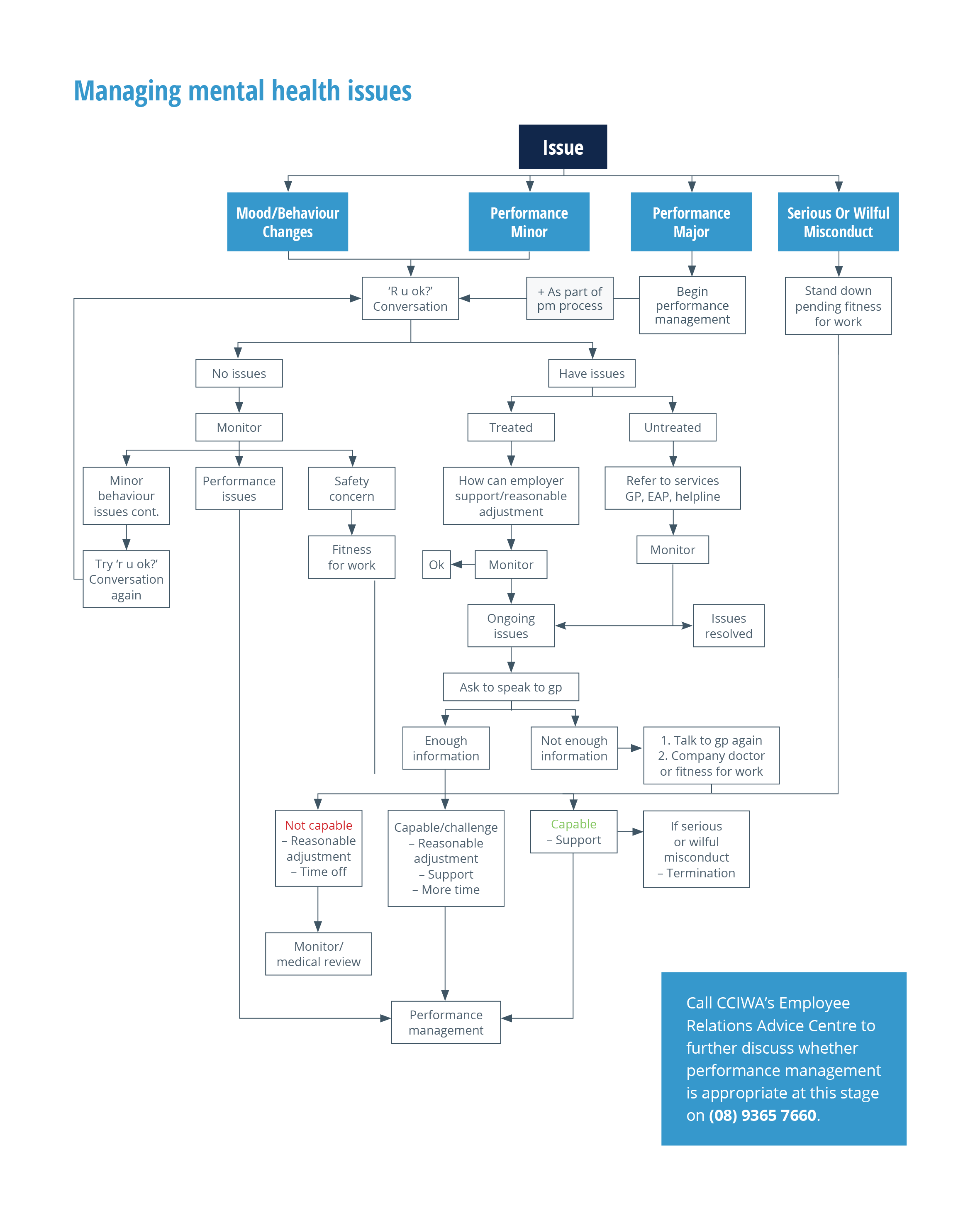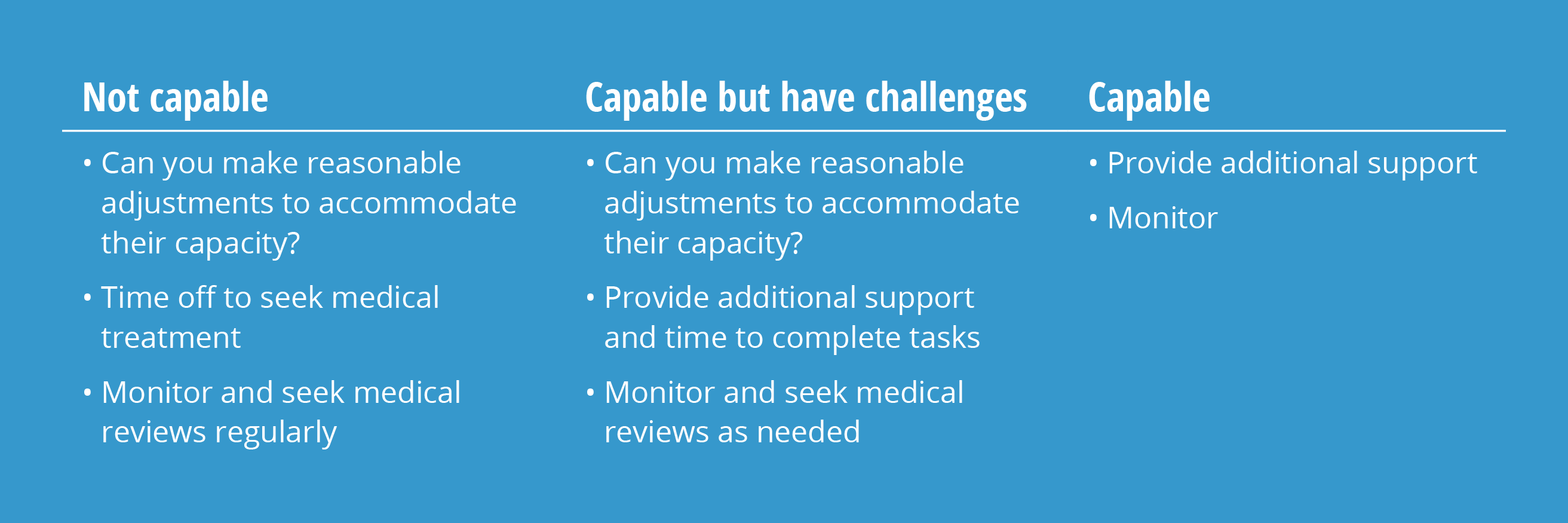CCIWA Mental Health Kit: Part 8 – Performance management and mental health issues
Mental health issues can impact a worker’s ability to do their job, which may lead to performance management.
Understanding these issues can help you tailor performance improvement plans appropriate for your staff.
Managing underperforming employees
There are a number of factors that impact on how well an individual works.
Knowing what these factors are enables you to find out what is going on in a particular situation and not just blame an employee’s attitude.
Mental ill-health can have a significant effect on the way a person thinks, behaves and responds to various situations. As a result, it is not uncommon for employees to cite mental health issues as a reason for their poor performance or unsatisfactory behaviour in the workplace.
What is underperformance?
Underperformance or poor performance can be exhibited in the following ways:
- low productivity;
- work that fails to meet quality standards;
- inability to meet realistic deadlines;
- persistent lateness, unexplained absences;
- lack of attention to detail, resulting in errors;
- excessive personal telephone calls;
- personal conflicts in the workplace; and
- unacceptable attitude – uncooperative, slow to help others, non-communicative.
How a mental health issue or illness may be identified
- performance management process;
- productivity decrease;
- absence;
- interpersonal issues/conflict;
- colleague concern; and
- observed mood or behavioural changes.
Refer to part 4 on how to have a conversation
It is generally appropriate to have a casual "R U OK?" conversation when the situation isn’t serious or when you are cautious about proceeding on a more formal basis based on the employee’s mental health condition or suspected issues.
Having this conversation may allow the employee to open up and let you know how their illness may be affecting their work and performance.
You may then be able to explore any work adjustments that may be made without compromising the core responsibilities of the position, keeping in mind that under Discrimination Legislation you have an obligation to consider reasonable adjustments.
Refer to part 7 on injury management and reasonable adjustments
It may also be appropriate to advise the employee that if their performance issues cannot be resolved or reasonable adjustments made, then the issue will be revisited as a performance concern.
There are broadly two outcomes:
- YES (I’m OK) – deny any issues > monitor employee and repeat R U OK conversation if symptoms persist; or
- NO (I’m not OK) – disclose.
Where performance issues continue but the employee continues to not disclose or acknowledge other causes, performance management (step 9) can commence.
However, start softly, giving the employee extra time to improve and more support. Consider adjustments and any suitable help you can offer them.
See the case study below on 'employer knowledge of mental health conditions'.
If an employee discloses they have an issue, there are broadly two categories:
- Treated
- Untreated
When an employee is receiving treatment this may make the process of implementing reasonable adjustments easier as they may be able to provide more, and specific, information.
They also already have a treating medical practitioner that you can contact (with permission) to provide further information as needed.
When an employee is untreated, in the first instance you would discuss with them possible adjustments and support services (i.e. own GP, EAP if you have one or other support services REFER to Part 10.)
After implementing these, if there is no improvement by the agreed review dates or the situation changes and they are not seeking treatment or assistance, then you may need to refer them to a medical practitioner (this may be a company doctor, occupational physician, specialist or fitness for work assessor).
If after implementing reasonable adjustments there is no improvement by the agreed review dates or the situation worsens, you may need to contact a medical practitioner.
If the employee is already under medical care it may be a case of asking permission to contact their treating doctor to get particulars around capacity and additional adjustments.
If they do not give permission or they are not under medical care, it may be reasonable for you to direct them to see a medical practitioner of your choosing or for them to undergo a fitness for work assessment.
When you have requested information from a medical practitioner, generally there are two broad outcomes:
- Enough information is provided.
- Not enough information is provided.
If there is insufficient information, try to talk to the treating practitioner requesting the required details (ask them again). If the necessary information is not forthcoming, consider sending the employee to a doctor of the company’s choosing or for a fitness for work assessment.
When a medical practitioner provides a medical capacity certificate, there are three possible outcomes:
Now you may consider following the standard steps an employer would usually follow when conducting performance management. Added to these are the additional steps that should be taken when there is knowledge that an employee is suffering from a mental health issue (i.e. additional support and time to consider and complete tasks). Also ensure the employee has a support person throughout the process.
Performance improvement plans
A performance improvement plan (PIP) is an HR tool that can be used to outline the specific steps to be taken by an underperforming employee to improve their performance.
PIPs should be issued by managers in consultation with Human Resources. If you are going to implement a PIP for an employee with a mental health issue, it is important that you understand whether the mental health issue is impacting the employee’s behaviour.
This can be done by sending your employee for a fitness for work assessment to gain further information about whether they are fit to undertake their role or if any adjustments need to be made. For more information on this process please REFER to Part 5 on medicals.
Prefer to pro-forma performance improvement plan
See the case study on performance management improvement plans below.

Case summary: employer knowledge of mental health conditions
A train driver was dismissed after he refused to undergo a competence assessment, because he alleged he suffered from post-traumatic stress disorder from an earlier train crash.
His employer did not know he was suffering from such a condition as the worker had only said he felt unwell. The condition was not diagnosed until after the dismissal.
The Federal Circuit Court (FCC) ruled that the employer took adverse action against the worker for dismissing him for health reasons.
The FCC also found the employer unlawfully discriminated against the employee by terminating on the basis of their disability.
On appeal, the Federal Court overturned the latter decision but upheld the former, entitling the employee to compensation.

Case summary: performance improvement plans
A Centrelink employee was suffering from a pre-existing mental health disorder of which their employer was aware, and following fitness for work assessments made some work adjustments to accommodate the employee.
Following the instigation of a formal performance improvement plan (PIP), the employee was terminated on the basis she had failed to attain and sustain the necessary standards of work performance for her role.
The parties disagreed on the integrity of the PIP process and extent to which the employee's psychological health affected her performance.
Fair Work upheld the termination, taking into account the lack of medical evidence, the fact the employee had not raised her psychological health as factor to be considered during the PIPs and the faliure to achieve and then sustain the PIP criteria is a valid reason for termination.
The Full Bench dismissed the employee's appeal.
TIP: Always make sure an employee with mental health issues is offered a support person for meetings regarding their performance or employment.
For advice and guidance on work, health and safety matters contact CCIWA’s Employee Relations Advice Centre on (08) 9365 7660 or email [email protected].






















